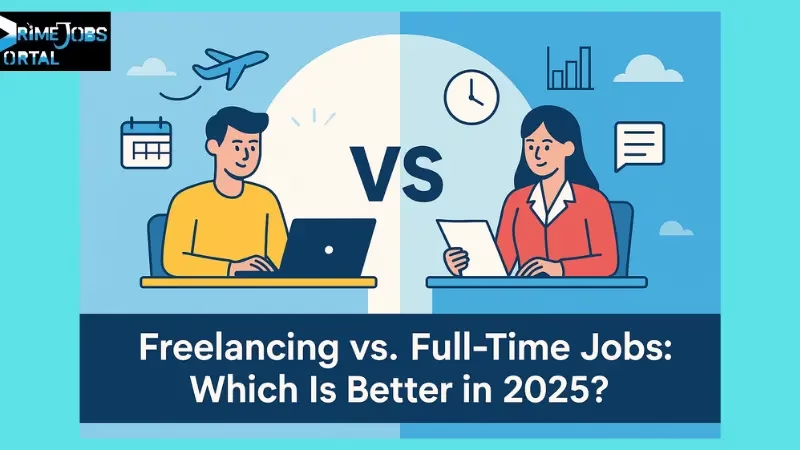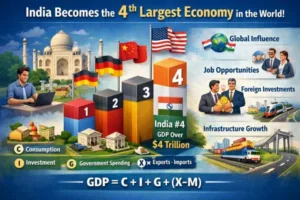With the rapidly evolving nature of the modern working world, there is no longer any need to be tied down to the traditional 9-to-5 job. Due to broadband internet, computer software, and platforms like Fiverr, Upwork, and LinkedIn, freelancing is now an option equal to full time work. But the question remains: Which one is better, Freelancing vs Full-Time employment?
Whether you’re a student, recent graduate, or mid-career professional looking to switch
This blog breaks down the reality of both choices. You’ll discover their pros and cons, pay, work life balance impact, and which one suits your life objectives and lifestyle in 2025
What Is Freelancing?
Freelancing is a situation where you sell your skills and services to many different clients without ever being the permanent employee of any one organization. You are not locked down by office hours, lengthy contracts, or company rules. Freelancers work gig-by-gig, get paid per gig or hourly, and have lots of freedom
From graphic design and content writing to digital marketing, resume writing, video editing, and integrating AI tools freelancers are establishing careers without ever entering an office. Freelancing gives people the freedom to decide what they wish to do, when, and with whom
It’s especially well suited for those who live in small towns, Telugu states, or anyone who has limited exposure to big cities because all you need is a laptop and an internet connection to earn globally
What Is a Full-Time Job?
A full time employment is an employment with the company on a monthly fixed pay. Full-time jobs usually provide benefits like insurance, holiday pay, promotions, Provident Fund (PF), and job security. Classic Indian jobs are software developers, teachers, engineers, analysts, and others
You typically work 8 to 9 hours a day, five or six days weekly. While many positions have transitioned to hybrid or remote work, the expectations and reporting structure still largely remain
Full-time employment is wonderful if you like planned workdays, predictable paychecks, and long-term planning
Work Flexibility Freelancing Gives Freedom Jobs Give Routine
Flexibility is perhaps the biggest advantage of freelancing. You decide on your own work schedule, take rest whenever you want, and even do work while moving around. It suits individuals who like to have their independence. They hate fixed timings or have other things on their plates such as studying or caring for others
Contrary to this, full-time employment involves pre-scheduled timings, expectations, and usually the hassle of traveling to and from work. The schedule may be relaxing for some, but disconcerting for others who prefer to be in charge of their day
If you are a person who values time autonomy, freelancing is for you. But if you work better under structured atmospheres, full-time employment offers more structure.
Earning Potential Limitless in Freelancing Predictable in Jobs
Freelancers charge what they want. You could charge ₹500 per project initially, or ₹5,000–₹50,000 per month on a few quality clients. The more connected and talented you are, the higher you will earn. There’s no limit to how much you can earn
Full-time careers pay a fixed salary. You may receive annual bonuses, but generally, things are slow and sure. A newbie may receive a ₹15,000–₹25,000 monthly salary. Salaries increase as you become more experienced but typically in increments of a fixed sum unless you change employers
If you are a fast learner and prefer getting things done, freelancing gives you quicker returns. But if security is your preference, a constant salary is reassuring
Job Security Full-Time Provides Stability Freelancing Demands Hustle
There is job security with full-time work. Your monthly salary arrives. You also receive insurance, leave days, festival holidays, and an EPF account. You can lose your job, but you are less likely to if you perform well and are in demand
Freelancing, however, turns your income project-based. You may make ₹40,000 one month and ₹5,000 the other. Without establishing long-term clients and a personal brand, there’s no guarantee
Freelancing is most appropriate for individuals who are okay with sporadic uncertainty and also enjoy experiencing growth thrills. For individuals who need predictable income to cover family, rent, or loans, employment is better
Skill Development Freelancers Learn Quick Jobholders Learn Deep
Freelancers work with numerous customers and projects. The quick exposure renders them multitaskers, time managers, customer handlers, and updated on tools like ChatGPT, Canva, Notion, and more.
Full-time staff, though, generally handle one job or specialty. You are richer in your department but would not have exposure outside that. Internal training is offered by some businesses, but learning would be slow and controlled
Freelancing makes you multi-skilled overnight. But full-time work gives you long-term guidance and in-depth subject knowledge
Work-Life Balance Depends on You in Both Worlds
Both the freelancer and the full-time employee experience work-life balance for different reasons.
Freelancers may overwork, find it difficult to disconnect, or feel isolated. But they can take a break whenever they want to
Full-time employees get to bring work home, face office politics, or suffer from long hours spent commuting. But they get to enjoy planned weekends, assured leaves, and a defined role
The truth is the concept of balance does not have anything to do with the nature of work, but it all lies in time management. Both frameworks call for self-control
Career Growth & Reputation Two Different Paths
A corporate job gives you titles, promotions, and company resumes that appears nice to headhunters. Corporate ladder advancement requires patience, but it is easily understood. Freelancers do not hold designations.
They build projects, client referrals, and online presence. You won’t be a manager but you can be an expert with a reputation, a speaker, or a consultant.
If you want to ascend corporate positions, a job is useful. If you want to create independence, freelancing provides quicker outcomes
Suitability Who Should Choose What?
Freelancing is perfect for homemakers, Tier-2/Tier-3 city residents, creators, side hustlers, and anyone with marketable skills and self-motivation. It’s particularly suitable for those capable of creating content, crafting digital products, or providing services such as reels editing, WhatsApp marketing, or resume crafting
Permanent employment suits those who like stability, financial stability, and long-term structured progress. It’s a good beginning if you’re fresh to the job market and need some guidance.
Most professionals in 2025 prefer a hybrid option job + freelancing. You do a job for stability, and freelance for extra money or to experiment with something new
Read More
How to Choose a Career Stream That Suits Your Personality
Career Options After 10th in India
Highest Paying Jobs Without a Degree in India 2025
Final Thoughts Which One Is Better?
There isn’t a single answer. The better option depends on your needs, goals, and personality.
Freelancing is like running your own small business. There is freedom but risk too. A job provides stability and structure but restricts flexibility
If you’re young, adventurous, and okay with uncertainty freelancing is the way to go.
If you need monthly checks and planning in advance over the long term a job is better.
If you’re stuck in the middle do both, and then select








